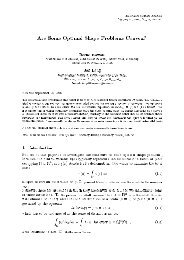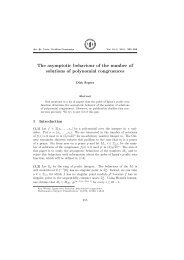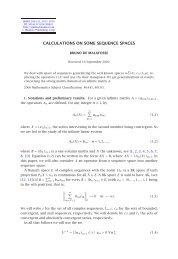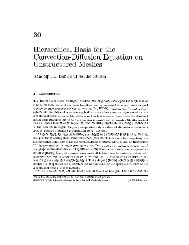the irrationality of sums of radicals via cogalois theory
the irrationality of sums of radicals via cogalois theory
the irrationality of sums of radicals via cogalois theory
- No tags were found...
Create successful ePaper yourself
Turn your PDF publications into a flip-book with our unique Google optimized e-Paper software.
16 Toma AlbuNote that <strong>the</strong> first two sections are <strong>of</strong> a very elementary level, being addressedto anybody wishing to be acquainted with older as well as newer resultson transcendental and irrational numbers. The last two sections require, however,some knowledge <strong>of</strong> Field Theory, including <strong>the</strong> Fundamental Theorem <strong>of</strong>Galois Theory.1 Transcendental and irrational numbersIn this section we present some more or less known results on transcendentaland irrational numbers, including those related to <strong>the</strong> <strong>irrationality</strong> <strong>of</strong> ζ(n) and<strong>of</strong> <strong>the</strong> Euler’s constant.By N we denote <strong>the</strong> set {0, 1, 2, . . .} <strong>of</strong> all natural numbers, and by Z(resp. Q, R, C) <strong>the</strong> set <strong>of</strong> all rational integers, (resp. rational, real, complex)numbers. For any ∅ ≠ A ⊆ C (resp. ∅ ≠ X ⊆ R ) we denote A ∗ := A \ {0}(resp. X + := { x ∈ X | x 0 }. If a ∈ R ∗ + and n ∈ N ∗ , <strong>the</strong>n <strong>the</strong> uniquepositive real root <strong>of</strong> <strong>the</strong> equation x n − a = 0 will be denoted by n√ a.Definitions 1.1. An algebraic number is any number a ∈ C which is a root <strong>of</strong>a nonzero polynomial f ∈ Q[X], and a transcendental number is any numbert ∈ C which is not algebraic.□Throughout this paper we will use <strong>the</strong> following notation:A := <strong>the</strong> set <strong>of</strong> all algebraic numbers,T := C \ A = <strong>the</strong> set <strong>of</strong> all transcendental numbers,I := R \ Q = <strong>the</strong> set <strong>of</strong> all irrational numbers.Examples 1.2. (1) Q ⊆ A since any a ∈ Q is <strong>the</strong> root <strong>of</strong> <strong>the</strong> nonzeropolynomial f = X − a ∈ Q[X].






